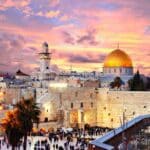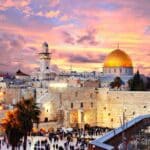Passover, or Pesach in Hebrew, stands as a cornerstone of the Jewish calendar, marking the profound tale of the Israelites’ liberation from Egypt, as chronicled in the biblical book of Exodus.
Spanning eight days, this cherished festival is observed with fervor, steeped in time-honored rituals and culinary delights. Israel, steeped in its historical and cultural resonance for the Jewish community, offers a truly distinctive setting to partake in the festivities of Pesach.
This blog aims to delve into the multi-dimensional celebration of Pesach in Israel, shedding light on how this age-old observance has gracefully evolved to incorporate modern customs and traditions.
The Historical Significance of Pesach in Israel.
Pesach in Israel holds immense historical significance in Israel, as it unfolds on the very soil where the Exodus saga unfurled.
At its core, Pesach in Israel recounts the monumental journey of the Israelites from bondage to freedom, punctuated by the awe-inspiring ten plagues and the miraculous crossing of the Red Sea.
Numerous locations in Israel, including Jerusalem, Tel Aviv, and Hebron, bear witness to this profound history, infusing Pesach festivities with a profound and deeply meaningful resonance.
The Old City of Jerusalem.
Jerusalem carries profound significance in the hearts of Jewish people around the globe. The Old City, home to the Western Wall, stands as a cherished destination for pilgrims.
During Pesach, thousands gather at the Western Wall for special prayers and blessings, reinforcing the deep connection between the festival and the city.
The Seder in Israel.
The Seder, a traditional Pesach meal, is an essential part of the festival. In Israel, the Seder is celebrated with a sense of historical reverence.
Families come together, and as per tradition, they retell the story of the Exodus through the Haggadah (the guide to the Seder).
The Seder plate, with its symbolic items like the matzah (unleavened bread) and maror (bitter herbs), is displayed, and the four cups of wine are raised in remembrance of the four promises of freedom.
The Impact of Pesach on Israeli Society.
Pesach in Israel is not just a religious festival; it has a significant impact on Israeli society as a whole.
- National Unity: Passover serves as a cornerstone for national cohesion in Israel, uniting Jews across diverse backgrounds, whether they adhere to religious practices or identify as secular. This collective celebration bridges gaps in politics, society, and culture, underscoring the value of upholding age-old traditions.
- Education and Awareness: During Pesach, educational institutions in Israel prioritize imparting the historical and cultural significance of the festival. This concerted effort aims to instill a profound understanding of Pesach’s importance among younger generations, demonstrating its continued relevance in a contemporary context.
- Humanitarian Initiatives: Pesach is a time for charity and social responsibility. Many organizations in Israel run campaigns to provide food and support to those in need, ensuring that everyone can celebrate the festival, regardless of their economic situation.
Modern-Day Celebrations.
- Public Events: Throughout Israel, various public events and festivals are organized to celebrate Pesach. These events often include music, dance, and cultural activities that bring people together.
- Community Seders: In addition to family Seders, many communities and organizations in Israel host communal Seders, providing opportunities for people to come together and share in the celebration.
- Charitable Giving: Pesach emphasizes the importance of helping those in need. Many Israelis take the opportunity to donate to charities or participate in volunteer activities during the holiday.
Pesach Traditions and Symbols.
Pesach in Israel is replete with traditions and symbols, each with its own unique meaning. These traditions are preserved while being adapted to modern life in Israel.
Cleaning and Chametz Removal.
One of the pre-Pesach traditions is thorough cleaning to remove any chametz from the house. In Israel, this practice is taken seriously, with families going to great lengths to ensure their homes are chametz-free.
Utensils, cookware, and dishes are made kosher for Pesach use by boiling them or using a special oven. This ensures that no chametz is used during the holiday.
Bedikat Chametz.
On the night before Pesach, Jews conduct the ritual of bedikat chametz, a search for any remaining chametz in the house using a candle and a feather.
It’s a symbolic act that connects modern Jews to their ancestors who did the same in ancient times.
The Afikomen.
The Afikomen is a piece of matzah hidden during the Seder, to be found by the children. This interactive tradition makes the Seder engaging for the younger generation and imparts the message of hope and redemption.
The Empty Chair.
An empty chair at the Seder table symbolizes the hope for the return of those who are not present, such as missing family members or prisoners of war. This tradition underscores the theme of liberation and unity.
Shopping for Pesach.
Special attention is given to buying food that is kosher for Pesach in Israel, including matzah, wine, and unique Passover products like macaroons and matzah meal.
Unique Pesach Traditions in Different Jewish Communities.
- Sephardic Jews: Sephardic Jews, with roots in Spain, North Africa, and the Middle East, have their own distinctive Pesach traditions. Their cuisine includes dishes like Mufleta, a sweet North African pancake, and other dishes featuring unique flavors and ingredients that reflect their heritage.
- Ashkenazi Jews: Ashkenazi Jews, with origins in Eastern and Central Europe, have their own traditions, such as gefilte fish and matzah ball soup. They also have unique customs and melodies for their Seder services.
- Ethiopian Jews:The Beta Israel community in Israel, who have Ethiopian Jewish heritage, celebrate Pesach with their own customs, which may include a unique Passover bread called “dabo” and a special ceremony involving washing feet.
- Yemenite Jews: Yemenite Jews have their own culinary traditions, which include dishes like Jachnun, a pastry that is baked slowly overnight, and Melawach, a flaky bread served with various toppings.
Pesach Food: Traditional and Modern.
Food is at the heart of Pesach in Israel celebrations. Traditional dishes have been passed down through generations, and modern Israeli cuisine has added a contemporary twist to the Pesach menu.
- Matzah: Matzah, the unleavened bread, is the most iconic Pesach food.It represents the swiftness with which the Israelites departed from Egypt. Modern variations include matzah pizza, matzah lasagna, and even matzah granola.
- Passover Seder Plate: The Seder plate includes symbolic foods such as maror (bitter herbs), charoset (a mixture of fruit and nuts), and a lamb shank bone, among others. In Israel, different regions have their variations of charoset, adding regional flavors and ingredients.
- Modern Israeli Fusion: In recent years, Israeli chefs have embraced Pesach as an opportunity to create fusion dishes. You can find Pesach-friendly versions of beloved Israeli dishes like hummus, tahini, and falafel, made with matzah or potato-based substitutes.
- Local Produce: Pesach in Israel falls during the spring, which is a time for fresh local produce. Israelis take advantage of this by incorporating seasonal fruits and vegetables into their Pesach recipes. It adds a modern and healthy twist to the traditional holiday meals.
Pesach in Different Regions of Israel.
Pesach is celebrated throughout Israel, and different regions have their unique customs and traditions.
Ashkenazi vs. Sephardic Pesach.
Ashkenazi and Sephardic Jews have their customs when it comes to Pesach In Israel. While both follow the basic Pesach rituals, there are variations in the Seder plate items and culinary preferences.
Ashkenazi Jews tend to eat more matzah-based dishes, while Sephardic Jews incorporate more rice and legumes.
Kibbutzim and Collective Communities.
In kibbutzim and other collective communities, Pesach is celebrated collectively, with communal Seders and meals.
The communal spirit is strong during Pesach, and everyone comes together to ensure the holiday is observed in the most meaningful way.
Jerusalem
Jerusalem, as the capital and a city with deep historical significance, has a unique Pesach atmosphere. The Old City hosts special events, and many visitors come to experience the historical and spiritual connection during this time.
The Future of Pesach in Israel.
Pesach in Israel continues to evolve, reflecting the changing dynamics of Israeli society. While the core religious and historical elements are preserved, modern influences are likely to continue shaping the festival.
- Interfaith Dialogues: Israel’s diverse population includes not only Jews but also Christians and Muslims. Pesach provides an opportunity for interfaith dialogues and understanding, emphasizing the themes of freedom, liberation, and hope that resonate with all.
- Environmental Awareness: As the world becomes more environmentally conscious, Pesach in Israel is likely to incorporate sustainable practices. This may include reducing food waste, using eco-friendly Seder plates, and emphasizing the connection between Pesach and nature.
- Technological Advancements: The use of technology in Pesach In Israel celebrations is expected to grow. Virtual reality Seder experiences, interactive Haggadah apps, and online resources for teaching children about the festival are just a few examples of how technology can enhance the Pesach celebration.
Conclusion.
Pesach In Israel embodies the seamless blend of ancient customs with modern festivities, providing a window into the rich mosaic of Jewish heritage and traditions.
This season serves as a distinctive crossroads between history and the contemporary world, spotlighting enduring principles such as liberty, solidarity, and optimism.
While the essence of Pesach remains unaltered, its manifestation is in constant flux, ensuring that this ancient festival retains its relevance in an ever-evolving world.
As we look to the future, Pesach in Israel will undoubtedly continue to adapt to the needs and desires of each generation, yet always retain its timeless significance.










